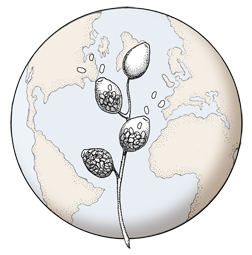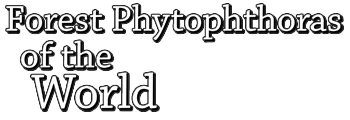References
Export 603 results:
[ Author ] Title Type Year
] Title Type Year Filters: Re-evaluation-phytophthora-species-isolated-during-30-years-vegetation-health-surveys-0 is [Clear All Filters]
. A combination of baiting and PCR techniques for the detection of Phytophthora quercina and P. citricola in soil samples from oak stands. Forest Pathology. 2001 ;31(2):85-97.
. The morphology, behaviour and molecular phylogeny of Phytophthora taxon Salixsoil and its redesignation as Phytophthora lacustris sp. nov. Plant Pathology [Internet]. 2012 ;(2):355–369. Available from: http://dx.doi.org/10.1111/j.1365-3059.2012.02638.x
. A twig blight of understorey European beech (Fagus sylvatica) caused by soilborne Phytophthora spp. Forest Pathology [Internet]. 2011 ;41:493–500. Available from: http://dx.doi.org/10.1111/j.1439-0329.2011.00711.x
. Prevalence, distribution and identification of Phytophthora species from bleeding canker on European beech. Phytopathology. 2010 ;28:150–158.
. A summary of North American hardwood tree diseases with bleeding canker symptoms. Arboriculture and Urban Forestry [Internet]. 2007 ;33(2):122-131. Available from: http://www.google.com/url?sa=t&rct=j&q=&esrc=s&source=web&cd=57&ved=0CE4QFjAGODI&url=http%3A%2F%2Fjoa.isa-arbor.com%2Frequest.asp%3FJournalID%3D1%26ArticleID%3D2985%26Type%3D2&ei=pKOvUpvjGcv7oASXoYDYDA&usg=AFQjCNHxNzEH7As_NfGpUf1LVGxbCXIeXA
. Non-lethal pathological infection of roots. Nature [Internet]. 1961 ;191:615-616. Available from: http://dx.doi.org/10.1038/191615a0
. Potential for eradication of the exotic plant pathogens Phytophthora kernoviae and Phytophthora ramorum during composting. Plant Pathology [Internet]. 2011 ;60:1077–1085. Available from: http://dx.doi.org/10.1111/j.1365-3059.2011.02476.x
. Rapid diagnosis of pathogenic Phytophthora species in soil by real-time PCR . Forest Pathology [Internet]. 2016 . Available from: http://dx.doi.org/10.1111/efp.12303
. Diversity of Phytophthora megakarya in Central and West Africa revealed by isozyme and RAPD markers. Mycological Research [Internet]. 1999 ;103(10):1225 - 1234. Available from: http://www.sciencedirect.com/science/article/pii/S0953756208606711
. First report of chestnut ink disease by Phytophthora katsurae on chestnut in Korea. Plant Disease [Internet]. 2008 ;92:p. 312. Available from: http://apsjournals.apsnet.org/doi/abs/10.1094/PDIS-92-2-0312A
. Port-Orford-cedar resistant to Phytophthora lateralis. Forest pathology [Internet]. 2006 ;36:385–394. Available from: http://onlinelibrary.wiley.com/doi/10.1111/j.1439-0329.2006.00474.x/full
. Surveys of soil and water reveal a goldmine of Phytophthora diversity in South African natural ecosystems. IMA Fungus [Internet]. 2013 ;4(1):123 - 131. Available from: http://www.imafungus.org/Issue/41/22.pdf
. Histopathology of infection and colonization of susceptible and resistant Port-Orford-cedar by Phytophthora lateralis. Phytopathology [Internet]. 2007 ;97:684–693. Available from: http://apsjournals.apsnet.org/doi/abs/10.1094/PHYTO-97-6-0684
. Assessment of sanitation and fungicide application directed at cocoa tree trunks for the control of Phytophthora black pod infections in pods growing in the canopy. European Journal of Plant Pathology [Internet]. 2007 ;117(2):167 - 175. Available from: http://link.springer.com/article/10.1007%2Fs10658-006-9082-8
. Management of black pod disease of cocoa with reduced number of fungicide application and crop sanitation. African Journal of Agricultural Research [Internet]. 2007 ;2(11):601–604. Available from: http://www.academicjournals.org/article/article1380898856_Opoku%20et%20al.pdf
. Phytophthora root and collar rot of mature Fraxinus excelsior in forest stands in Poland and Denmark. Forest Pathology [Internet]. 2011 ;41:510–519. Available from: http://dx.doi.org/10.1111/j.1439-0329.2011.00714.x
. First record on Phytophthora spp. associated with the decline of European beech stand in south-west Poland. Phytopatologia Polonica. 2006 ;42:37-46.
. Surveying for and eradicating Phytophthora ramorum in agricultural commodities. Plant Health Progress. 2004 .
. Detection of Phytophthora lateralis in soil organic matter and factors that affect its survival. Phytopathology. 1977 ;67:79–84.
. Significance of Phytophthoras and Pythium for oak, alder and spruce decline. Journal of Forest Science. 2001 ;47(Special Issue):96-103 .
Strategies of attack and defence in woody plant- Phytophthora interactions. Forest Pathology [Internet]. 2014 ;44(3):169–190. Available from: http://doi.wiley.com/10.1111/efp.12096
. A revised systematics of twelve papillate Phytophthora species based on isozyme analysis. Mycological Research [Internet]. 1991 ;95(9):1025 - 1046. Available from: http://linkinghub.elsevier.com/retrieve/pii/S0953756209805431
. The Phytophthora online course: Training for nursery growers . Sudden oak death fourth science symposium [Internet]. 2010 ;Gen. Tech. Rep. PSW-GTR-229:355. Available from: http://www.fs.fed.us/psw/publications/documents/psw_gtr229/
. Phytophthora ramorum colonizes tanoak xylem and is associated with reduced stem water transport. Phytopathology [Internet]. 2007 ;97:1558-1567. Available from: http://apsjournals.apsnet.org/doi/abs/10.1094/PHYTO-97-12-1558


